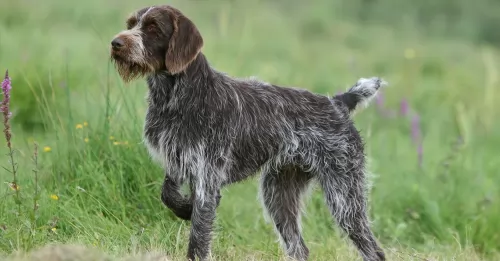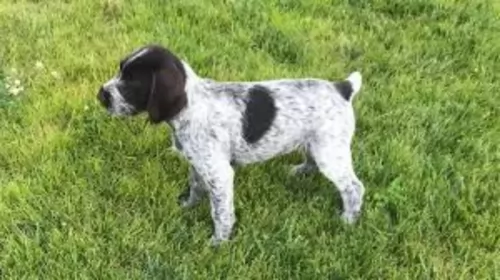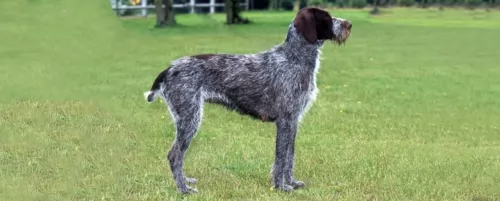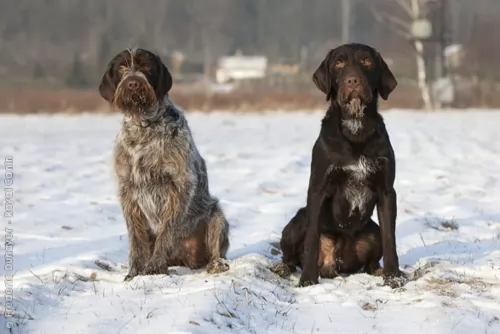 Petzlover
Petzlover Cesky Fousek is originated from Czech Republic but Rafeiro do Alentejo is originated from Portugal. Cesky Fousek may grow 9 cm / 3 inches shorter than Rafeiro do Alentejo. Cesky Fousek may weigh 32 kg / 70 pounds lesser than Rafeiro do Alentejo. Cesky Fousek may live 3 years more than Rafeiro do Alentejo. Cesky Fousek may have less litter size than Rafeiro do Alentejo. Cesky Fousek requires Low Maintenance. But Rafeiro do Alentejo requires Moderate Maintenance
Cesky Fousek is originated from Czech Republic but Rafeiro do Alentejo is originated from Portugal. Cesky Fousek may grow 9 cm / 3 inches shorter than Rafeiro do Alentejo. Cesky Fousek may weigh 32 kg / 70 pounds lesser than Rafeiro do Alentejo. Cesky Fousek may live 3 years more than Rafeiro do Alentejo. Cesky Fousek may have less litter size than Rafeiro do Alentejo. Cesky Fousek requires Low Maintenance. But Rafeiro do Alentejo requires Moderate Maintenance
 The Cesky Fousek is also known as the Bohemian Wire-Haired Pointing Griffon and he hails from the Czech Republic. The name ‘Fousek’ is referring to the dogs facial hair.
The Cesky Fousek is also known as the Bohemian Wire-Haired Pointing Griffon and he hails from the Czech Republic. The name ‘Fousek’ is referring to the dogs facial hair.
With World War 1, the dog all but disappeared, but with careful breeding, its numbers have built up. Today the dog is a popular hunting breed in its home country. In 1957 and 1958, Czechoslovakia joined the Federation Cynologique Internationale, and this is when a new breed standard was written and approved. In 1964, the dog breed was recognized by the FCI and by the United Kennel Club in 1996.
The Cesky Fousek has even been represented on postage stamps issued in the country in 1965, and again in 1973. Today, the breed is as popular as ever in the Czech Republic as well as other countries where there are breeding programs.
 Known also as the Portuguese Mastiff, the Rafeiro do Alentejo comes from Portugal and has always been used as guardian for livestock. Their numbers declined quite a bit when there was no longer a need for this kind of job.Today it is essentially a companion dog.
Known also as the Portuguese Mastiff, the Rafeiro do Alentejo comes from Portugal and has always been used as guardian for livestock. Their numbers declined quite a bit when there was no longer a need for this kind of job.Today it is essentially a companion dog.
The official standard of the Rafeiro do Alentejo was established in 1953. The dog is is recognized as a breed by the Portuguese Caniculture Club as well as the Federation Cynologique Interationale.
 The Cesky Fousek is a medium sized dog with both the male and the female standing between 58 – 66cm and weighing 22–28kg. The dog has a fairly distinctive appearance, looking quite a bit like a German Wire-haired Pointer, but he has the mustache and beard which the Pointer doesn’t have.
The Cesky Fousek is a medium sized dog with both the male and the female standing between 58 – 66cm and weighing 22–28kg. The dog has a fairly distinctive appearance, looking quite a bit like a German Wire-haired Pointer, but he has the mustache and beard which the Pointer doesn’t have.
The tail of this dog is carried horizontally and is generally docked to 3/5 of its natural length to give the dog a distinctive look. These days, with regulations around docking, the tail is left long. The ears are floppy and rounded at the tips and the eyes are brown.
The dog’s coat is short to medium length and fairly coarse with colors being dark roan or brown with ticked markings.
The Cesky Fousek is an energetic, eager-to-please dog and he just loves playing with the children in the home. He is an intelligent dog who is loyal, social and protective and you’ll find that he is easy to train. In fact, with socialization and training, he becomes obedient and amicable around adults, children and other pets.
 The Alentejo is a large dog standing at between 64 and 75cm in height and weighing 45 to 60kg. He is a powerful dog with a deep chest, dark eyes, floppy ears. His coat is short to medium length, thick and straight. The color of the coat is a mix of fawn, a wolf grey, white, cream and black.
The Alentejo is a large dog standing at between 64 and 75cm in height and weighing 45 to 60kg. He is a powerful dog with a deep chest, dark eyes, floppy ears. His coat is short to medium length, thick and straight. The color of the coat is a mix of fawn, a wolf grey, white, cream and black.
This is a serious dog with a calm demeanour about him. It doesn’t matter how calm he is though, as every dog will require training ad socialization if you want to enjoy having an obedient, well mannered dog around you. This is particularly important with a large, independent, self-confident, territorial dog like this.
He isn’t an aggressive dog but he is protective, wanting to guard and look out for his human family. They are dogs that get on well with children and other pets in the home, being wary of strangers.
They’re not recommended for life in small properties in the city as he requires a large garden at least.
 The Cesky Fousek is a fun loving, good natured dog who is always up for a game. This is why he isn’t a dog that will fit into an apartment or shoe-box size garden.
The Cesky Fousek is a fun loving, good natured dog who is always up for a game. This is why he isn’t a dog that will fit into an apartment or shoe-box size garden.
Socialize and train him and he becomes a wonderful family pet, good around children and other pets. He loves human companionship and isn’t a dog to be left outside to run around on his own.
The Cesky Fousek is easy to train, and when he is treated properly and made to feel an important member of the family, he provides you with his unconditional love and friendship.
 The Rafeiro do Alentejo is a quiet dog, but intelligent and strong-willed. Training and socialization will make him easy to get on with.
The Rafeiro do Alentejo is a quiet dog, but intelligent and strong-willed. Training and socialization will make him easy to get on with.
He will become an excellent companion, and can come indoors because he is well mannered and considerate. He was bred to be a guard dog, and the responsibilities he had taking care of livestock has been transferred to looking out for- and protecting his human family.
He makes a wonderful pet and companion, even with children and other pets, more so when brought up correctly by loving, firm, consistent dog owners.
 The average lifespan of this dog breed is about 12 to 15 years, and even though he is a robust breed, some common health issues do exist.
The average lifespan of this dog breed is about 12 to 15 years, and even though he is a robust breed, some common health issues do exist.
Certainly if you’re considering breeding for your Cesky Fousek, you’ll want to have him tested for dysplasia, eye problems and Von Willebrands Disease.
Von Willebrands Disease is an inherited bleeding disorder, caused by a deficiency in the amount of a specific protein needed to help platelets.Often the dog doesn’t show outward evidence of having the disease while other dogs might even hemorrhage from the nose or elsewhere.
 The Rafeiro do Alentejo is a generally healthy dog breed, and with good care can get to 11, 12 or 13 years of age.
The Rafeiro do Alentejo is a generally healthy dog breed, and with good care can get to 11, 12 or 13 years of age.
Of course with a large dog like this, it is always a good idea to be aware of canine hip dysplasia, particularly because this is a large dog with a deep chest.
This makes him also vulnerable to bloat, a condition where the stomach swells with gas and which can be life threatening. Other things to watch for are ear infections and parasites.
 The coat of the Cesky Fousek is easy to maintain and you’ll want to brush him at least twice a week with a firm bristle brush to get through the coarse hair and rid him of loose hairs.
The coat of the Cesky Fousek is easy to maintain and you’ll want to brush him at least twice a week with a firm bristle brush to get through the coarse hair and rid him of loose hairs.
Ear infections are common in dogs, but dogs with floppy ears are more susceptible to ear infections than dogs with erect ears. The infection often starts in the external ear canal and occurs when excess bacteria grows in the ear canal and it becomes inflamed.
Always take your pet to the veterinarian at the first sign of an ear infection. You’ll notice your pet shaking his head and the ear may well be red and inflamed. Your vet will discuss the proper treatment and suggest ways to prevent recurrence. The vet may also recommend an ear cleaning solution as well.
This dog breed needs plenty of exercise and he’ll love his daily walks with you. Put him on a leash and allow him to run with you when you go cycling or jogging.
This is a very active dog used to hunting and he’ll require good quality protein. Speak to your vet about how many calories your dog will need each day, more so if you have a puppy and are unsure in terms of his growth.
He is a medium-to-large breed so you’ll want a food that caters for his size, his age and his energy. Include portions of rice, vegetable and meat into his kibble from time to time for variety, and never forget to include some raw meat into his diet.
Fresh, cool water is of critical importance and should be available night and day.
 Make your grooming time with this serious, calm canine friend of yours a special bonding time. His coat simply requires a brush twice a week to keep it healthy and shiny.
Make your grooming time with this serious, calm canine friend of yours a special bonding time. His coat simply requires a brush twice a week to keep it healthy and shiny.
While bushing him, run your hands over him to make sure there aren’t any unusual lumps. Check inside the floppy ears to make sure they’re not red which could be the start of a painful ear infection.
Look a his nails and trim them if they’ve become too long. Check inside his mouth and make sure there aren’t any black, rotten teeth as this can seriously impact the health of your pet.
Options for exercise will include long walks and a chance to run off his leash. In the back yard it will be to his benefit to throw balls for him to fetch. You can even bring him indoors and play some calm games with him. He should have exercise every single day.
Good food is needed for good health. It is always convenient to make use of the commercially manufactured dog foods there are on the market.
You don’t want to feed this to your dog day after day so provide your pet with some tasty home-made food too. Dogs want simplicity and consistency with their diets so they don’t battle with upset stomachs and an unnecessary trip to the vet.
Some home-cooked food twice a week and added to the dry kibble can keep him healthy and happy. Boiled chicken, sweet potatoes, brown rice or pasta, carrots and spinach will be perfect for him. Chop the food up finely and add it into the dry kibble once or twice a week.
Some people even cook it in bulk, refrigerate it and warm up small portions to add to the kibble. Raw meat added in occasionally can also be a good treat. Make sure your pet is never without a constant supply of fresh, cool water.